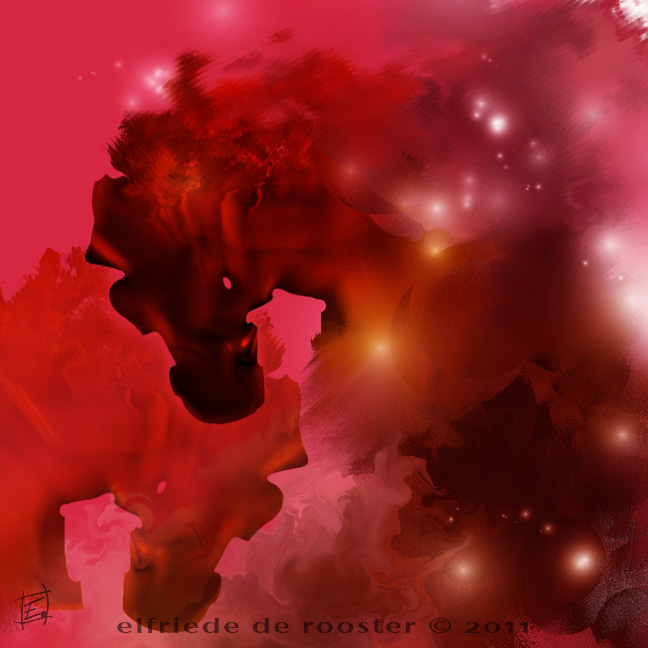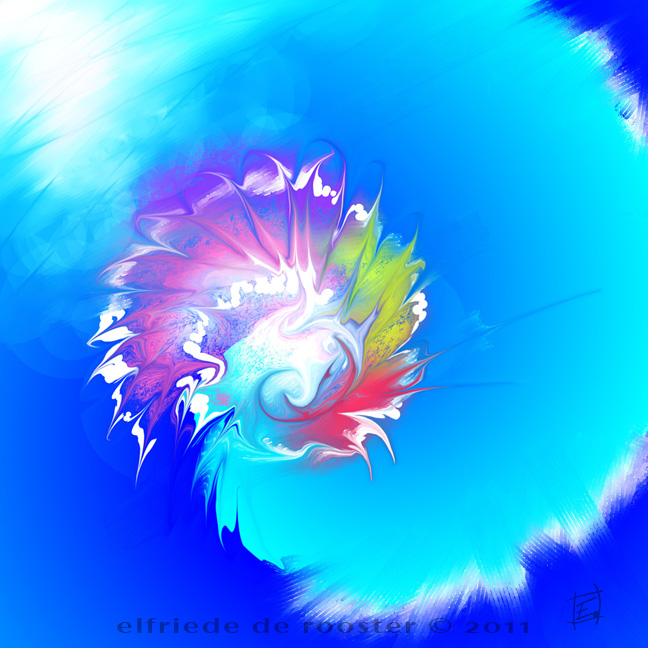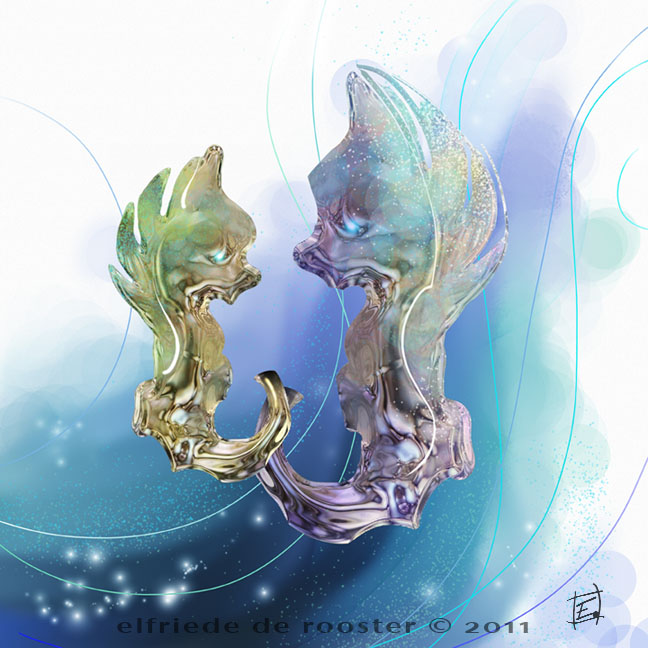“Untitled”, an interview with artist Elfriede de Rooster
Interview by Beverly Sinton, PWI
|
|
|
Elfriede de Rooster, belgian artist- interviewed by Beverly Sinton, PWI
|
PWI – When and why did you decide to become an artist?
Elfriede – I have always been involved with art, it has been a thread running through my whole life. In college I studied art, and specialised in publicity. I worked for several studio’s in Belgium amongst them Studio Peyo (smurfs cartoons) where I truly learned how to construct characters. The knowledge acquired during that time, and the dedication to honing my skills even more during my free time led me to a job working for a major animation company in Denmark. Ready to face the underlying causes of my unhappiness In 2000 I went to a healer who gave me some homework. First, I had to paint again preferably with a natural medium such as oils. However it was very important not to think about which colours to use or what I wanted to paint. At the time I had only a little bit of space and created small pieces of oil paintings. Around the same time I also started to use a software application to make
digital paintings.
Secondly, the healer recommended that I spend a lot of time in nature, to reconnect with nature. What I have noticed is that the
energy of nature is found throughout my art – the shapes of nature, the light and shadow. Nature plays a major role in my life and gives me a feeling of rejuvenation and joy, not only but especially on my walks.
The first two helped me to feel myself again. To reconnect with who I am, my desires, my talents and how to put them to good use to help and inspire others.

The third thing the healer advised me was to learn how to say ‘no’. It is not easy for me to refuse when someone asks me to do something, but I had to learn not to take on the responsibility of others and to learn how to value my time.
I continued travelling, and spent time in Ireland. It was in Ireland I realised it was painting I wanted to do, and that this could also help people. Then I went to California for 2 and a-half years, and as soon as I arrived there I started to network. As I met people I was given many opportunities, which I didn’t always take. But I did make contact with the Belgian Consul while I was in the U.S. and I was offered an
exhibition in the Residency. I found the people I had already met were willing to sponsor me, and I was able to mount the exhibition.
By the way to really answer the question, or to summarise: When did I become an artist ... the realisation of this was in Ireland. Denmark had paved the way for this realisation.
Why did I become an artist ... it’s a calling, it’s coming from within. It feels right for me. I didn’t become an artist to help people. The desire to help has always been there ... but realising that I can also help by being an artist, that was a major realisation. Before that I thought that only nurses, doctors and people like that could help ...
it’s about feeling worth and knowing that each has a place and a reason for their existence. The way I paint has taught me a lot about myself.
PWI – What was your previous profession? Which skills and qualities could you bring from your former career into your new career as an artist?
Elfriede - As mentioned in the previous paragraph, art has always been part of my life. After having been self-employed a first time - from 1992 to 2001 - I worked in several areas going from house-cleaning, to driving, to working in a vegetarian restaurant. I can’t say that I have brought qualities and skills from these experiences into my art, since my art was there first. Rather the opposite, but that has more to do with me as a person that found more peace with who I am, than with being an ‘artist’. I travelled a bit back and forth, doing some interim work here in Belgium in the meantime.

In 2007 I came back to Belgium ‘for good’ and worked for three years at the airport (security). Not anything to do with my art at all, however a very conscious choice because I really needed a break from it. You see when I came back from the US I thought I had failed to become the artist I wanted to be. So this job was a necessity financially and it also gave me the space to heal emotionally and re-find my self-confidence. The second time I took the leap to be self-employed (part-time if you like) was last year - 2010.
To summarise: skills and qualities concerning my art have not been brought from other careers, nor have those careers influenced my art in any way.
However the skills and qualities inherent to me, as a more conscious person, and which have been ‘opened’ since Denmark have led me to many places and careers. Over the last few years I have been exploring some other directions. I spent some time studying to be a pastry chef, and I just finished 2 years of sign language.
Although I have moved on,
everything in my past has taught me something, and I have learned from all my experiences (artistic and others). Since Denmark I do paint intuitively – and the result can be abstract or figurative. I try to open myself up to the inspiration within me, and when I do pictures flow very easily.
PWI – What are the advantages of working as an artist?
Elfriede - For me
the main advantage is that I am freelance which means I can live at my own pace. Before I decided to become an independent artist for a second time I was working for a security firm at the airport – I had to work irregular hours and my life was controlled by an alarm clock. Now my life has a more natural rhythm, like the ebb and flow of the sea. I think the biggest change in my life has been moving f
rom working on other people’s projects to working on my own, which of course can still involve cooperation with others.
And, of course, I am not only an artist but also a business woman. I need to sell my work in order to earn my living; and for me, that is the hardest part. When I was in the US I refused some job offers because I thought that everything else would be a distraction from me being an artist, but also be a failure on my part of not being able to create an income from my art. I needed to concentrate on being an artist.
PWI – What are the main obstacles to success for an artist, and specifically for a female one?
Elfriede - I am not sure that being female is an obstacle to being a professional artist –
I think men and women have equality with regard to obstacles and opportunities. My personal obstacles have been learning to value myself and my work, and being confident enough to ask a sensible price. It took me a long time to stop undervaluing my work – but people who want to buy art are willing to pay for it.

;
I needed to learn to be firm about my painting. ‘Art’ is usually defined by what is shown in galleries by those who decide for others what ‘art’ ought to be, and by art critics. A lot of art galleries only want to display a certain type of art which is after all natural since they are the ones who sell what they have in their galleries – or they are often full, with long long waiting lists.
I want my work to reach many people because I know my art has value and can somehow help, so I created
my own website and I was using a website called Fine Art America. I have discovered that I really need to make my own opportunities.
On a side note ... I have a relationship with each piece I create, but I want the people who see it, the people who will buy it, to have their own relationship with the art.
That’s why I do not title the work. I refuse to interpret the work for others. If I would do so, they would place once more their own ‘power’ outside themselves. Doing this would not resonate with my intention and vision; which is to help empower others, to help them to trust their own inner guidance, to help them to feel again and to help them to take responsibility for their own choices.
Therefore,
I do not title the work.
PWI – What are your plans for the future? Where do you think your art will take you?
Elfriede - I am thinking of starting workshops for children and teenagers, and using a projector to teach them how to draw. I am also thinking of doing a lecture, maybe for adults, focusing on aspects of my life story and showing people which tools I use to create my art. At the moment I am
using the computer to make 3-D sculptures, and I am really excited about that. There are lots of possibilities for me, and I am feeling very positive about my future. Whatever I do, it will involve art.
PWI – This probably shouldn’t be the last question, but could you give us a definition of art?
Elfriede - If I really have to define the word art:
Art is indeed a mastery of a skill, any skill ... however for me I feel when combined with the heart, with life, with emotion it’s taking work to a higher level.
Taking painting as an example I would say that everyone can paint and use it to express themselves, but it doesn’t make them persé artists because of the lack of having mastered that specific skill to understand paint, light and shadow. On the other hand when someone has mastered a skill, but lacks the joy of using it to create ... it’s not art either. In the end it’s just a word, and I find it rather annoying that people have such a desire to want to label just anything, to put anything in boxes. It’s so constraining. Therefor I prefer to talk about “craft” because it still points to a mastery of a skill. The word “art” has become limited. But again everyone can enjoy making “art” without being a master painter – if you have expression - and everyone does in one way or another - you don’t need a perfect technique. For me, my work is about expressing myself. Also very important to me:
“art” shall not be explained, it’s something that has to be felt ... and that is very different to everybody.
If it has to be explained it’s losing its magic ... another reason why I don’t title my work!
Thank, Elfriede, you for talking to us and we wish you well with your future career.
| Short Biography |
Elfriede de Rooster, was born in Belgium and has a college degree from an Art School in Belgium, followed by a one year course in publicity. She has experience in illustration, publicity, strip cartoons and story-boarding for television animation.
Currently she is working as an independent artist and her work can be seen on webpage http://web.mac.com/eldero and you can search for Elfriede on Facebook.
|
| web.mac.com/eldero |
